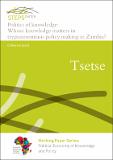Politics of knowledge: Whose knowledge matters in trypanosomiasis policy making in Zambia?
| dc.contributor.author | Grant, Catherine | |
| dc.coverage.spatial | Zambia | en |
| dc.date.accessioned | 2015-08-10T13:30:15Z | |
| dc.date.available | 2015-08-10T13:30:15Z | |
| dc.date.issued | 2014-11-14 | |
| dc.identifier.citation | Grant, C. (2014) Politics of knowledge: Whose knowledge matters in trypanosomiasis policy making in Zambia? STEPS Working Paper 73, Brighton: STEPS Centre | en |
| dc.identifier.isbn | 9781781182017 | |
| dc.identifier.uri | https://opendocs.ids.ac.uk/opendocs/handle/20.500.12413/6701 | |
| dc.description | One of a series of seven working papers considering the political economy of One Health. | en |
| dc.description.abstract | This paper explores the framings of trypanosomiasis, a widespread and potentially fatal zoonotic disease transmitted by tsetse flies (Glossina species) affecting both humans and livestock. This is a country case study focusing on the political economy of knowledge in Zambia. It is a pertinent time to examine this issue as human population growth and other factors have led to migration into tsetse-inhabited areas with little historical influence from humans. Disease transmission in new human-wildlife interfaces such as these is a greater risk than in historically populated areas, and opinions on the best way to manage it are deeply divided. Diverse framings are held by key actors looking from, variously, the perspectives of wildlife and environmental protection, agricultural development, poverty alleviation, and veterinary and public health. From these, four narratives about trypanosomiasis policy were identified. These are focused around four different beliefs: that trypanosomiasis is protecting the environment; that it is causing poverty; that it is not a major problem and, finally, that it is a Zambian rather than international issue. Within these narratives there are also conflicting views on the best control methods to use and different reasoning behind the pathways of response. These are based on incompatible priorities of people, land, animals, the economy and the environment. These diverse perspectives are examined through interviews with key actors and analyses of how these narratives have shaped policy decisions and funding. | en |
| dc.description.sponsorship | Ecosystem Services for Poverty Alleviation (ESPA) | en |
| dc.language.iso | en | en |
| dc.publisher | STEPS Centre | en |
| dc.relation.ispartofseries | STEPS Working Paper;73 | |
| dc.rights | Users are welcome to copy, distribute, display, translate or perform this work without written permission subject to the conditions set out in the Creative Commons licence. For any reuse or distribution, you must make clear to others the licence terms of this work. If you use the work, we ask that you reference the STEPS Centre website (www.steps-centre.org) and send a copy of the work or a link to its use online to the following address for our archive: STEPS Centre, University of Sussex, Brighton BN1 9RE, UK (steps-centre@ids.ac.uk). | en |
| dc.rights.uri | http://creativecommons.org/licenses/by-nc-nd/3.0/ | en |
| dc.subject | Health | en |
| dc.title | Politics of knowledge: Whose knowledge matters in trypanosomiasis policy making in Zambia? | en |
| dc.type | Series paper (non-IDS) | en |
| dc.rights.holder | STEPS Centre | en |
Files in this item
This item appears in the following Collection(s)
Except where otherwise noted, this item's license is described as Users are welcome to copy, distribute, display, translate or perform this work without written permission subject to the conditions set out in the Creative Commons licence. For any reuse or distribution, you must make clear to others the licence terms of this work. If you use the work, we ask that you reference the STEPS Centre website (www.steps-centre.org) and send a copy of the work or a link to its use online to the following address for our archive: STEPS Centre, University of Sussex, Brighton BN1 9RE, UK (steps-centre@ids.ac.uk).


